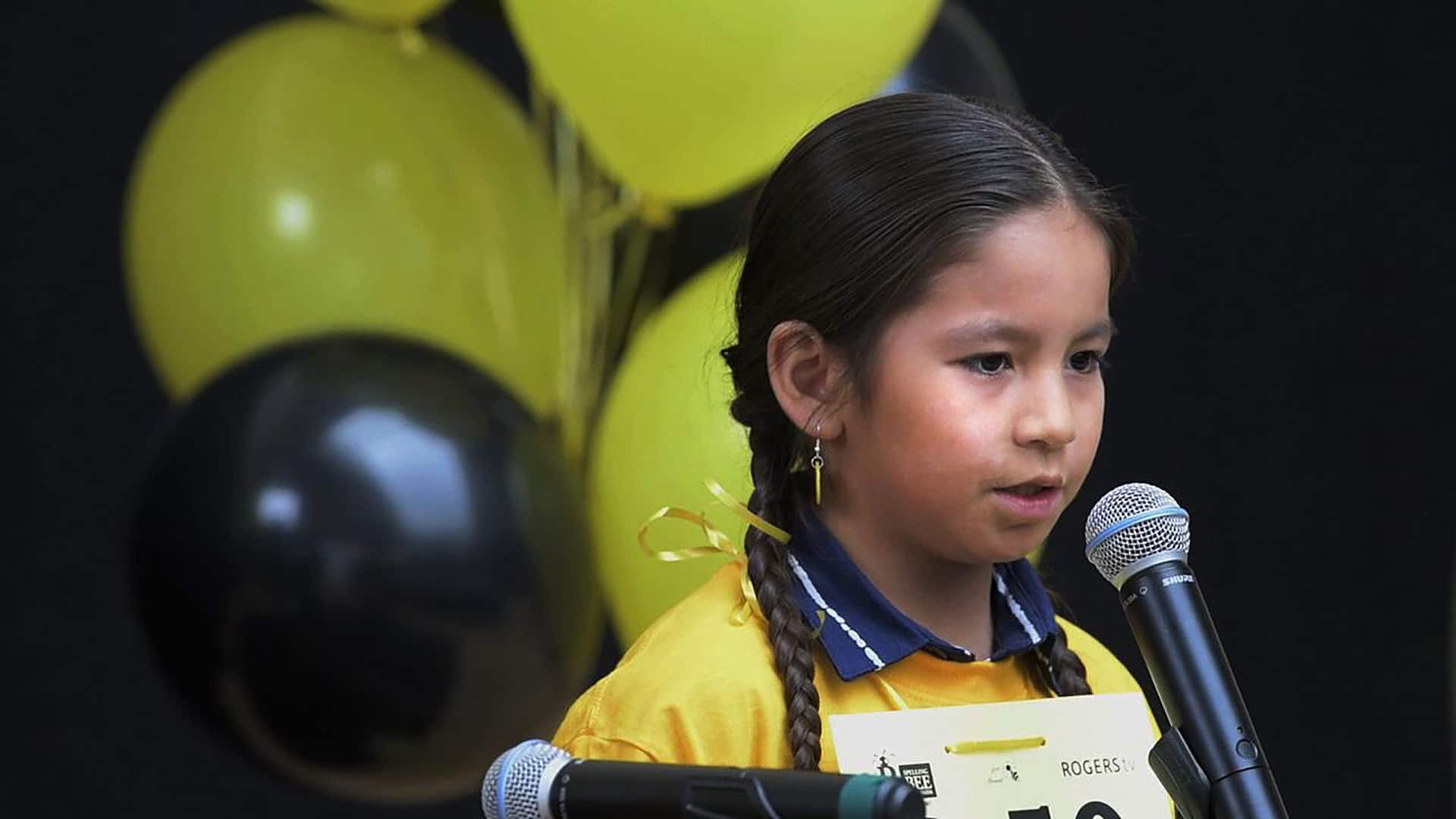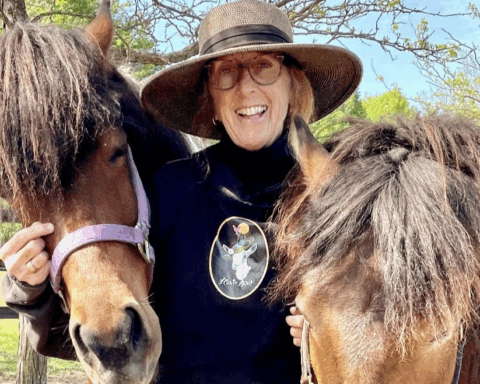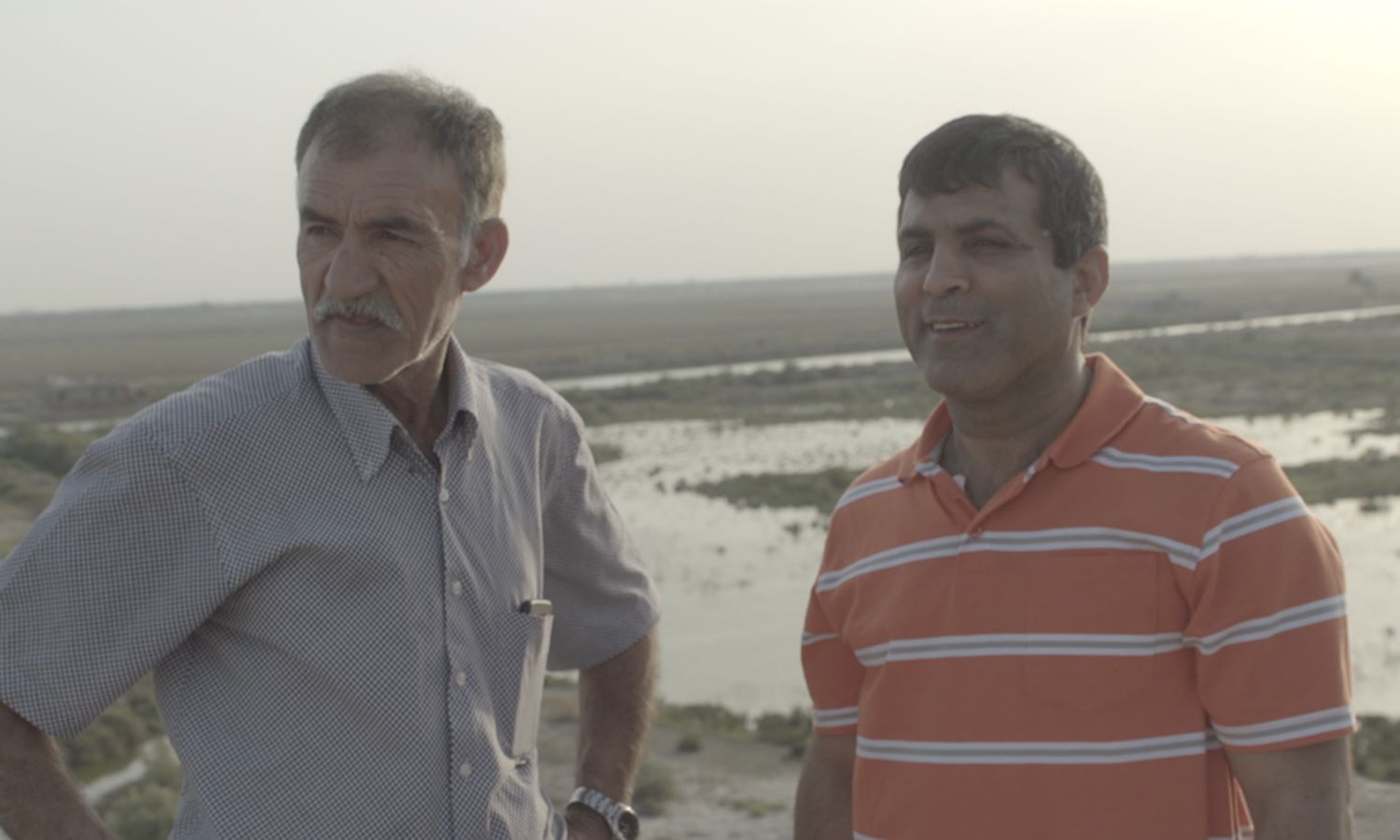Do you remember what it was like to compete in a spelling bee? The study? The nerves? The urge to compete? Did you prepare with help from your friends or your family? As a parent, do you have dreams for your children? Do you help them to work hard to reach their potential?
If you can relate to any of these questions, Bee Nation is intended for you. Lana Šlezić has crafted a film that highlights the aspirations and ambitions of kids on reserves in Saskatchewan as they prepare for and compete in an historic, first-time First Nations Spelling Bee. The winners in three age categories are flown to Toronto to compete in the National Spelling Bee—and attend a Blue Jays game.
Along the way, we get to know the kids, their parents, their teachers and the rather tough conditions they face. William, 8, is already a star pow-wow performer. His parents are devoted and supportive of his abilities, personal style and potential. They, like all the families featured in Bee Nation, want their son to complete high school and pursue his education off the reserve. Savannah lost her mother to a car accident when she was very young and is clearly struggling. Her best friend, Josie, hangs out with her and they work together to study for the competition. Josie never knew her mother; she is being raised in a multi-generational home by her grandparents. Makayla, who is in grade 5, is ambitious and smart; her father is aware that talent isn’t enough and is determined that she will succeed. Thomas is one of four kids of a single mother who considers herself lucky because she has a car to take the family to town.
All of the parents seem reconciled to the fact that their children will have to leave the reserve, certainly to get an education. One mother speaks of hoping that her child will visit from time to time after she’s finished her studies. There is little work or economic activity on the reserve. At the same time, their life in Saskatchewan is portrayed as quiet, safe and desirable because it is full of family and close friends.
Šlezić is an accomplished documentary photographer who has travelled to Afghanistan and India in addition to covering the lives and situations of people living closer to home. Her photographs reveal the common humanity of people living in physical conditions that most urban Canadians would find appalling—not to mention the systemic misogyny or racism they endure. She does not shy away from depicting physical destruction, but by focusing on people living their lives, she reminds us that they are just like us; we could be them.
The origin of Bee Nation parallels the stories within it: a parent, seeking resources to help her child excel, finds Spelling Bee Canada’s website. Šlezić says, “I hadn’t heard about spelling bees in Canada for a long time (I was away for about 10 years), although I had participated in them when I was in school. I contacted Julie Spence, the executive director. She told me about the programme, and then I asked her if there was anything interesting or different happening this year [2016]. When she told me about this initial First Nations spelling bee, I was very moved by the idea.”
Julie Spence put Šlezić in touch with Pauline Favel, the organiser of the First Nations Spelling Bee, from Poundmaker Cree Nation in Saskatchewan. Favel and her colleagues raised funds and organised the competition for 21 First Nations. Families and communities were encouraged to support the effort. Šlezić found the organiser inspiring.
“Pauline said, ‘Why not us? Why shouldn’t we send our kids to the national spelling bee competition? What’s stopping us?’ I was moved by her passion and her story, and I flew out 10 days later to meet her.” With introductions from Favel, Šlezić then started driving around to Saskatchewan reserves, meeting children who were preparing for the spelling bee along with their parents, teachers and coaches.
Many documentaries are the product of long gestations while others happen almost spontaneously when a story arises and a filmmaker is ready. Šlezić says, “I have a gut instinct about stories. Is it sensitivity? Heart? When I feel strongly, I have to do something about it. I just go.”
Šlezić travelled alone in Saskatchewan with a minimum of equipment. She spent time building relationships and followed whatever was happening in each community. Šlezić uses different techniques, both watching life as it unfolds and actively interviewing people. She does not appear on camera. “It isn’t about me. I just want to ask the questions, to learn, to make the subjects comfortable, for the story. There is a lot of hanging out to build trust before the camera gets turned on.”
The film shows children playing naturally with their friends and siblings, studying with their parents or coaches, having a bite to eat and, occasionally, melting down from the stress. Šlezić’s ability to shoot footage herself, using a small digital camera and natural light, pays off in scenes of family life that seem authentic. The focus is always on the people in the story. The reserves, with their natural beauty, tight-knit communities and lack of amenities, serve as the backdrop to the human lives.
While Šlezić was new to life on reserve, her documentary photography experiences in Afghanistan, India and elsewhere had prepared her for life in third-world conditions. “The reserves are not unlike many third world countries. There are issues with running water. The sewage truck drives around to each house once a week. The diet was the most striking thing: they have no access to fresh fruit and vegetables. I stayed in the nearest town to each reserve, and I could see how far they would have to go to a real store. On reserve, there are convenience stores with junk food, packaged food and bread, milk and eggs.”
Although Šlezić visited the communities for only a few days each time, she entered the children’s lives and homes slowly. A born documentarian, Šlezić describes what she does: “Listen. Become part of what is happening around you. I didn’t have a crew, which really works because you gain intimacy. It’s the same when I’m a documentary photographer. I could not have done it with a big crew.”
Bee Nation is not the first film about the promise and unfulfilled potential of First Nations children caused by the chronic underfunding of education on reserve. Alanis Obomsawin covered Cindy Blackstock’s long court case on the matter in We Can’t Make the Same Mistake Twice (2016) and the remarkable campaign called Shannen’s Dream in Hi-Ho Mistahey! (2013). Victoria Lean touches on the failure of the province to step in to support the children of Attawapiskat in After the Last River (2015). Lana Šlezić takes a different approach.
“Negativity, especially when persistent, can be fatiguing,” she says. “It makes us tired to listen to bad news all the time. And so when there is a hopeful and more inspiring story, perhaps we will be more moved by it. It touches us differently, fills us up rather than deflating us. Which does not take away from the issues at all, as they are very real, but maybe, hopefully, a story like Bee Nation will connect us more as human beings.
“I want to get non-First Nations people to open their hearts and minds. There is no ‘us’ and ‘them.’ You have to see for yourself, as mothers, fathers, educators. There’s no difference. But most people can’t go, so I am the eyes and ears for others. There is good and we need to know about it. We need to come together as parents. We all can relate to parents’ dreams for their wonderful children. Without my parents looking after my children, there would be no film. It’s a parallel to going out and seeing these parents give everything for their children’s future.”











